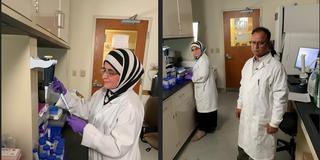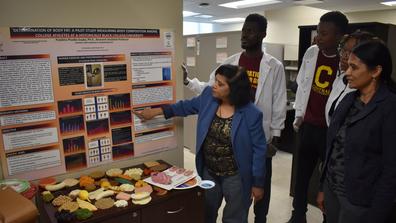Mentoring in the field of medical research: Six questions for the researcher

Dr. Hend Al Issa hails from Aleppo, Syria. She graduated from the University of Aleppo Medical School in 2002 with a degree in obstetrics and gynecology and became a licensed ob-gyn in 2008. She is certified by the Arab Board of Health Specializations in obstetrics and gynecology.
She worked in Saudi Arabia as an ob-gyn from 2008 to 2015 when she and her husband emigrated to the U.S. She says that her post-doctoral experience at Central State University — which could run between one and two years — is expanding her knowledge of research. She responded to questions submitted by Cyril Ibe, communications and media specialist, Central State University 1890 Land-Grant Program.
Q: What is the focus of your post-doc research project at Central State University, and what is your role in Dr. Kazi Islam’s research?
A: We are working on diabetes mellitus (DM) and cardiovascular diseases: prevention, protection, and improvement. We are studying the role of nitric oxide and hydrogen sulfate as protective factors from these diseases.
Q: What do you hope to learn from your work in a Central State University lab?
A: I am looking to expand my experience in biochemistry and molecular biology research, especially prospective types of research.
Q: How is the mentoring you are receiving from Dr. Islam helping you in realizing your goal of being able to conduct more prospective rather than retrospective studies?
A: Dr. Islam is teaching and explaining to me step by step what I have to do in research. He supports and advises me, gives me his feedback, and finally helps me define and reach my goals.
Q: Are there any differences in how you are learning to conduct scientific research at Central State University, compared to how it is done in Syria?
A: There are many differences. First of all, my old experience was mainly concentrated on retrospective research. Here at Central State University, I am exposed to advanced technologies and very accurate and sensitive apparatus, which were not available to me back home in Syria. I am so happy and excited about what I am learning at this University.
Q: What particular skills would you like to have regarding how to conduct research by the time you complete your post-doc stint at Central State University?
A: My dream is to be able to conduct my research, using all the advanced analysis methods; to achieve my initial goal of serving my community and meeting their needs in health and wellness through research.
Q: Would you recommend to fellow Syrians an opportunity like the one you have at Central State?
A: Yes. Definitely. For many reasons, first of all, as I mentioned before I am working in labs provided with all required equipment and advanced technology. I am learning a lot, and I see myself advancing every day. I am also working in a very comfortable environment; I feel that I am very welcome. Everyone here is so kind, nice, and ready to help. It does not take time to find yourself as a welcome member of the Central State University family.


